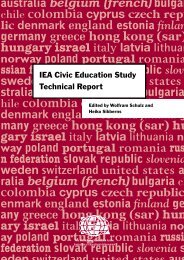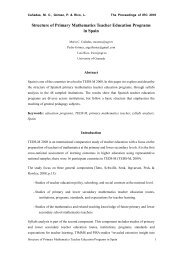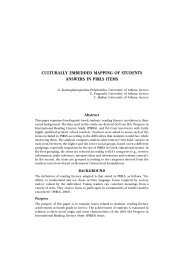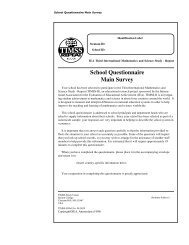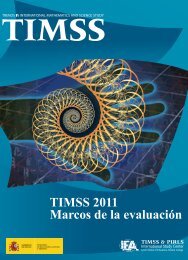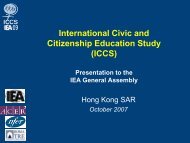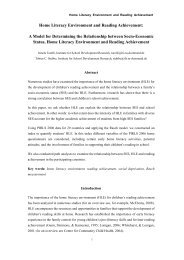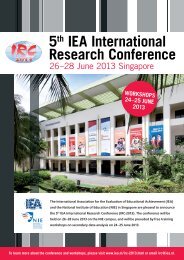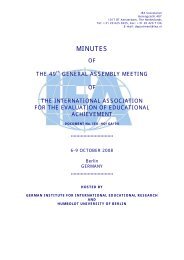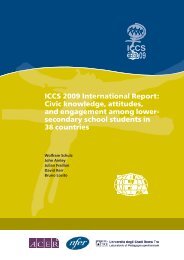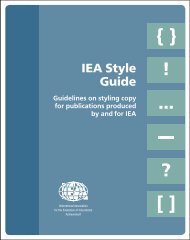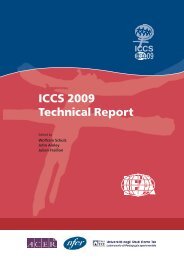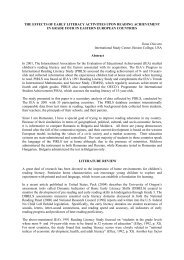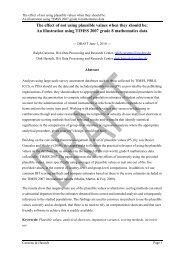Teacher Education and Development Study in Mathematics - IEA
Teacher Education and Development Study in Mathematics - IEA
Teacher Education and Development Study in Mathematics - IEA
Create successful ePaper yourself
Turn your PDF publications into a flip-book with our unique Google optimized e-Paper software.
PART 2: AUSTRALIA<br />
53<br />
secondary education, 16.2% specialized <strong>in</strong> physics, chemistry, or mathematics, <strong>and</strong> 4%<br />
specialized <strong>in</strong> <strong>in</strong>formation <strong>and</strong> communication technology (ICT). Of the graduates with<br />
Master’s degrees enter<strong>in</strong>g secondary education, an even higher proportion specialized<br />
<strong>in</strong> chemistry, physics, or mathematics (Ballantyne et al., 2003).<br />
Over the last two decades, fewer mathematics <strong>and</strong> science graduates have entered teacher<br />
education programs or teach<strong>in</strong>g directly. A 2003 report published by the M<strong>in</strong>isterial<br />
Council on Employment, <strong>Education</strong>, Tra<strong>in</strong><strong>in</strong>g, <strong>and</strong> Youth Affairs (MCEETYA) noted<br />
that only six percent of mathematics degree holders, six percent of life science degree<br />
holders, <strong>and</strong> three percent of physical science degree holders entered teacher education<br />
programs or the teach<strong>in</strong>g profession. In 1998/1999, 61% of Grade 8 mathematics classes<br />
were be<strong>in</strong>g taught by teachers with a degree major <strong>in</strong> mathematics, <strong>and</strong> 72% of Grade 8<br />
mathematics classes were be<strong>in</strong>g taught by teachers with a major <strong>in</strong> either mathematics<br />
or mathematics education. Dur<strong>in</strong>g the same period, 70% of Grade 12 mathematics<br />
teachers <strong>and</strong> 80% of Grade 12 science teachers had a three-year or beyond mathematics<br />
or science degree, respectively.<br />
<strong>Teacher</strong> salaries<br />
Average teacher salaries <strong>in</strong> Australia for new teachers <strong>and</strong> teachers with 15 years of<br />
experience are close to the means for the OECD countries. Salary distributions vary<br />
across the states <strong>and</strong> territories, however. Australian teachers tend to reach the summit<br />
of the salary scale (140% of the start<strong>in</strong>g salary) after about 8 to 11 years. The start<strong>in</strong>g<br />
salaries of teachers are generally higher than those of other professionals, but the<br />
shortened salary schedule for teachers means that teachers reach their maximum salary<br />
b<strong>and</strong> more quickly than other professionals reach theirs.<br />
By referr<strong>in</strong>g to ABS employee salary <strong>and</strong> hours data for 2000, <strong>and</strong> on the assumption<br />
that teachers have only four weeks of annual leave, <strong>in</strong> l<strong>in</strong>e with the leave complements<br />
of other occupations, Webster <strong>and</strong> colleagues (2004) found that teachers <strong>and</strong> other<br />
professionals have the same average hourly wage rate of $AU25.00. However, on tak<strong>in</strong>g<br />
the leave complement as 12 weeks, the researchers found that teachers had a 20%<br />
higher hourly wage rate, <strong>and</strong> that their wages were exceeded only by IT professionals.<br />
Webster et al. (2004) additionally controlled for age, experience, education level, <strong>and</strong><br />
other background <strong>and</strong> job-related characteristics, <strong>and</strong> found that teachers’ salaries were<br />
somewhat below those of other professionals.<br />
Data from the 2001 Census of Population <strong>and</strong> Hous<strong>in</strong>g (ABS, 2001) showed teachers<br />
earn<strong>in</strong>g more than the average worker per week ($AU897 versus $AU799). The census<br />
also reported secondary school teachers earn<strong>in</strong>g more than elementary school teachers<br />
per week ($AU956 versus $AU841). Male teachers generally were earn<strong>in</strong>g more than<br />
their female counterparts: the average weekly salary of a male secondary school teacher<br />
at the time was $AU1,038 compared to $AU878.<br />
A 2003 report by the Committee for the Review of Teach<strong>in</strong>g <strong>and</strong> <strong>Teacher</strong> <strong>Education</strong><br />
noted that the start<strong>in</strong>g salaries of recent teacher education graduates exceeded those of<br />
average graduates. As expected, holders of dentistry, medic<strong>in</strong>e, optometry, eng<strong>in</strong>eer<strong>in</strong>g,<br />
law, computer science, <strong>and</strong> mathematics degrees had higher start<strong>in</strong>g salaries, while<br />
graduates with earth, physical, <strong>and</strong> biological science majors had slightly lower start<strong>in</strong>g<br />
salaries.



